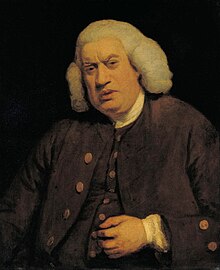Life of Samuel Johnson (Hawkins book)
His biography described Johnson's life, including previously unknown details about his writing career, but it was plagued by digressions into unrelated topics.
[3] After joining the Ivy Lane club, he married Sidney Storer, heir to a 20,000 pound fortune with Hawkins receiving an addition 10,000 pound dowry, in 1753 and his career started to quickly pick up: he bought a home on the Thames at Twickenham near Horace Walpole; he published Izaak Walton's The Compleat Angler in 1760; he was appointed as a magistrate in 1761; in 1765 became Chairman of the Quarter Sessions for the County of Middlesex; and wrote a A General History of the Science and Practice of Music in 1776.
This provoked an anonymous article in St. James's Chronicle, which started by attacking Hawkins: "It is evident from the Conduct of the late Dr. Johnson, that he designed Mr. Boswell for the sole Writer of his Life.
His being appointed one of his executors, gave him an opportunity of taking possession of such fragments of a diary and other papers as were left; of which, before delivering them up to the residuary legatee, whose property they were, he endeavoured to extract the substance.
Sir John Hawkins's ponderous labours, I must acknowledge, exhibit a farrago, of which a considerable portion is not devoid of entertainment to the lovers of literary gossipping; but besides its being swelled out with long unnecessary extracts from various works, (even one of several leaves from Osborne's Harleian Catalogue, and those not compiled by Johnson, but by Oldys,) a very small part of it relates to the person who is the subject of the book; and, in that, there is such an inaccuracy in the statement of facts, as in so solemn an authour is hardly excusable, and certainly makes his narrative very unsatisfactory.
But what is still worse, there is throughout the whole of it a dark uncharitable cast, by which the most unfavourable construction is put upon almost every circumstance in the character and conduct of my illustrious friend; who, I trust, will, be a true and fair delineation, be vindicated both from the injurious misrepresentation of this authour, and from the slighter aspersions of a lady who once lived in great intimacy with him.
The knight sinks under the weight of his subject, and is glad to escape to scenes more congenial to his disposition, and more suitable to his talents, the garrulity of a literary old man.
"[12] Arthur Murphy anonymously wrote in the Monthly Review: "Sir John most probably acquired his notions of language at his master's desk: he admired the phraseology of deeds and parchments, whereof, to speak in his own manner, he read so much, that in consequence thereof, he has been chiefly conversant therein and by the help of the parchments aforesaid, missed the elegance above mentioned, and uses works, that in them we sometimes meet with, and being bred and attorney, he caught the language of the said trade, whereof he retains so much, that he is now rendered an incompetent critic thereby, and in consequence thereof.
"[13] Steevens, under the name "Philo Johnson" claimed in the European Magazine: "the great solid principle that secures its condemnation, is the spirit of malevolence to the dead, which breathes all through it.
"[15] This followed with a joke in a later journal: a "gentleman, lately arrived in town, has been for several days past afflicted with a lethargy, owing to the perusal of three chapters in Hawkins' Life of Johnson.


